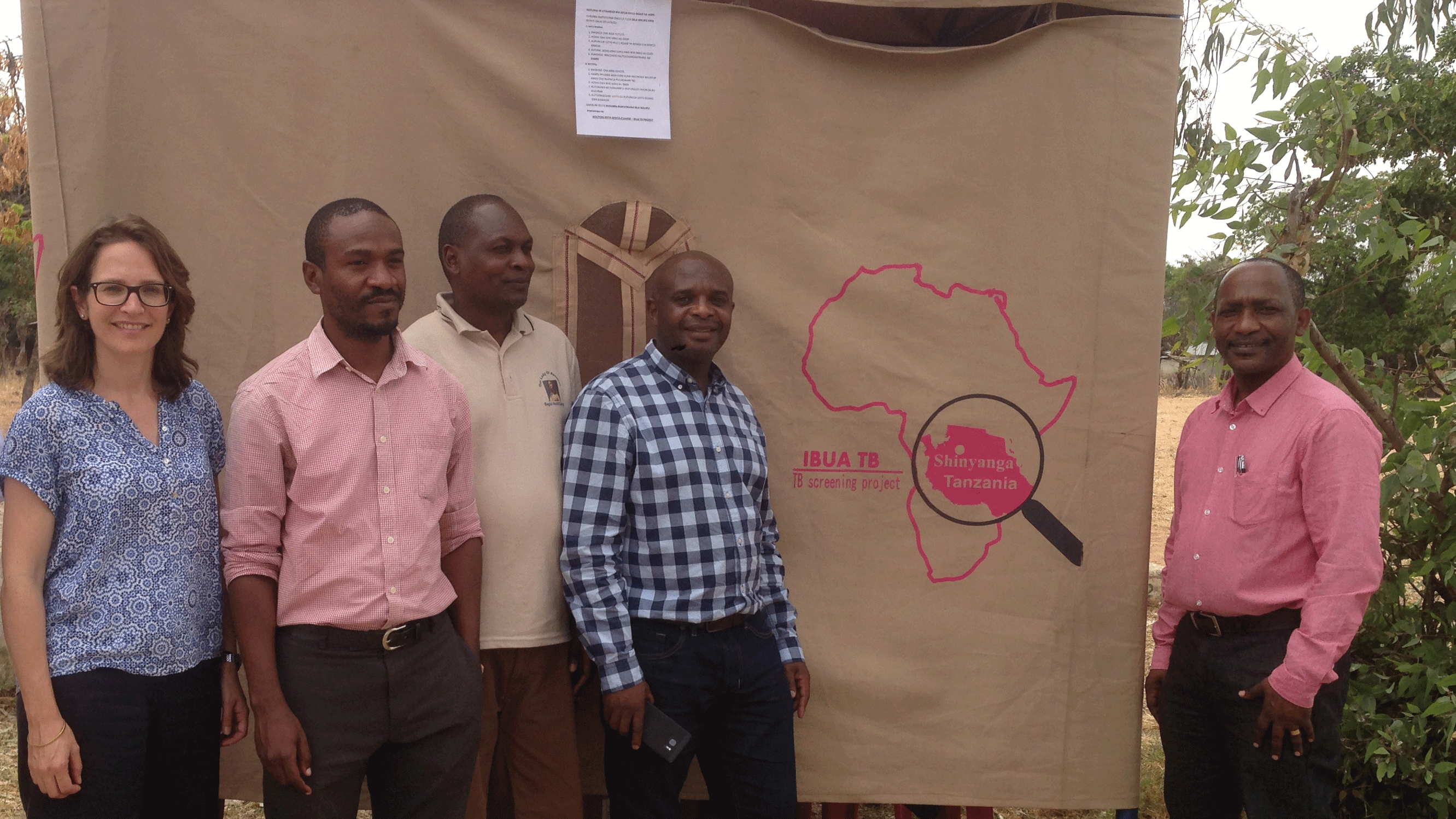
08 Aug Joint screening for HIV and tuberculosis may increase earlier access to treatment: AIGHD-led project
A recently completed project has shown aligning tuberculosis (TB) screening with existing HIV screening efforts may improve earlier detection and treatment.
IBUA TB, which stands for Integrating tuBerculosis screening into a Universal test and treat Approach, was developed after a 2012 TB prevalence survey found that only 37-48% of tuberculosis cases were being found in Tanzania. In Swahili, IBUA means ‘to go into the community and find’ – and that’s exactly what the team sought to do in terms of finding undetected TB cases.
TB is the ninth cause of death worldwide and the leading cause from a single infectious agent, ranking above HIV and AIDS, according to the World Health Organization. Infectious Disease Elimination is also one of AIGHD’s research priorities.
Funded by the STOP TB Partnership’s TB REACH initiative and led by AIGHD, IBUA TB sought to improve detection of TB in communities in rural Tanzania by integrating tuberculosis screening into the ongoing HIV Test & Treat program. The HIV Test & Treat program was recently implemented by Doctors with Africa CUAMM in collaboration with AIGHD and seeks to screen rural communities for HIV to diagnose and treat the infection earlier and reduce the likelihood of death. IBUA TB is also focused on earlier screening to save lives and the TB screening team went into the field with the HIV screening team and did their own testing alongside.
The IBUA TB team set a target of screening 10,000 people throughout the year-long project; in the end, over 14,000 were screened. All people were screened verbally and those who presented with symptoms were sent for further testing and, if determined to have TB, connected with treatment.
“We know that in Tanzania, only about 50% of people with TB are being found and connected to screening and treatment. On top of this, many people living with HIV also have TB so this project was incredibly important to try to find people with TB disease to decrease the mortality and spread of the disease,” said Asst. Prof. Sabine Hermans, AIGHD Academic Staff and principal investigator of the project.
Earlier case detection through mobile technology
In all, 29 cases of TB were diagnosed through the screening. Though the number seems small, it has a further reach as the individuals were connected to treatment earlier, minimizing the potential of them spreading the highly contagious disease to their family, friends and network.
Family members of those who were found to have TB were also initially screened using mobile technology so they did not have to make, in some cases, a full-day journey to a clinic for testing. The National TB program in Tanzania has since launched an official text screening service to try and further reach those who may not otherwise have access to screening.
“This aspect of our project could serve as proof of principle in other countries as well, especially where remote communities are prevalent,” said Asst. Prof. Hermans, adding it enables preliminary screening right in the comfort and privacy of a patient’s home.
The project also had an unanticipated benefit: the local clinic saw an increase in the number of people coming to the facility to get tested.
“We know there is stigma associated with HIV and TB resulting in a reluctance to get testing, especially in a public place. Since the project began, there was an influx of people coming to the clinic to get screened which resulted in more TB cases being found and more people getting connected to the treatment they needed sooner.”
Specialized training to support ongoing screening
In addition, because care providers were trained to screen for TB by the IBUA TB project team, people who come into the local clinic for other reasons were also asked if they wanted to be screened for HIV and TB. This resulted in more TB cases being found over the past three months than in all previous quarters of the project. As a follow up, and to help support screening moving forward, the IBUA TB team is providing further training to the local team over the coming weeks.
“Our goal with this project was to determine if screening in this manner was an efficient use of resources and to find more TB cases. While I think tweaks need to be made to the approach, the project itself had a number of both expected and unexpected benefits that we hope will be useful for the Tanzanian government – and others – in making decisions about how to best support the testing and treatment of this curable and preventable disease.”
The project team will analyze all data and write several papers that they hope will be published in academic journals by the end of the year.
Project partners
A number of partners and people were involved in the project, including among others:
- NIMR Muhimbili, Dar es Salaam, Tanzania: Professor Sayoki Mfinanga (co-PI), Dr Godfather Kimaro (scientific coordinator), Dr Godbless Charles (project coordinator, based in Shinyanga)
- CUAMM Doctors with Africa, Shinyanga: Veronica Censi (project manager Test & Treat project)
- Bugisi Health Centre: Sr Kate Costigan, IBUA TB field team and laboratory technician
- National TB and Leprosy Programme: Dr Laurent Mhembe (Regional TB and Leprosy Officer, Shinyanga), Dr Daniel Singolile (District TB and Leprosy Officer, Shinyanga)
Photo (L-R): Sabine Hermans (PI), Godbless Charles (IBUA TB project coordinator), Twaha Hussein (IBUA TB field staff), Kimaro Godfather (scientific coordinator), Prof Sayoki Mfinanga (co-PI)
